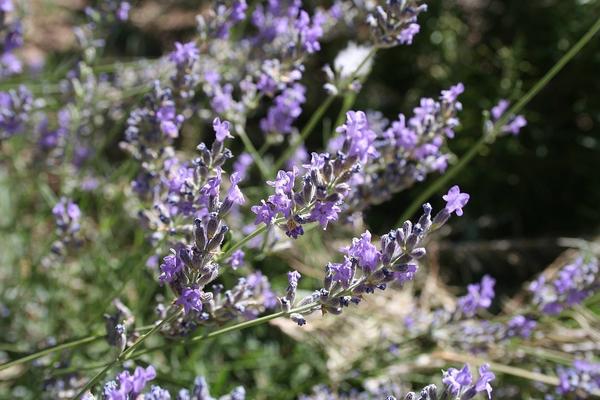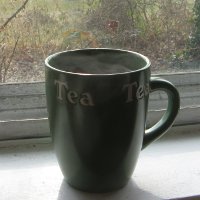Herbs and Herbal Teas for Anxiety
Wikipedia: Anxiolytic#Herbal_treatmentsLast Updated: Oct. 31, 2013
 Lavender is one of many herbs used to treat anxiety. Photo © Josemanuel (Wikimedia Commons), CC BY-SA 2.5.
Lavender is one of many herbs used to treat anxiety. Photo © Josemanuel (Wikimedia Commons), CC BY-SA 2.5.There are a variety of treatments for anxiety, including exercise, diet, psychotherapy, meditation and mindfulness training, and many others.
Of all these remedies for anxiety, herbal teas are most similar to pharmaceuticals(drugs), in that they do not address the root cause of the anxiety in a permanent manner. Pharmaceutical treatments for anxiety have not been shown to produce any gains after their use is discontinued.[1] However, there are several compelling advantages to using herbal teas rather than synthetic drugs. This article explores some of ways in which drinking herbal tea can reduce anxiety, and concludes with a list of herbal teas that show evidence of having relaxing or anti-anxiety effects.
The process of drinking herbal teas can be relaxing:

The process of drinking hot liquids can be relaxing in a variety of ways.
Warmth in general is relaxing, and drinking warm liquids has a relaxing effect on the body by activating the parasympathetic nervous system, reducing the body's stress response. This effect is pronounced enough that when developing a control study for measuring the relaxing effects of drinking an herbal tea, the effect must be compared to hot water. Even the act of holding a warm cup filled with hot liquid can effect both the body and mind, promoting interpersonal warmth, generosity, and the perception of others as more warm and caring.[2]
Merely smelling certain aromas can also produce measurable, sometimes significant effects, and these effects can include relaxation. These effects are usually immediate, and provide the basis for aromatherapy. The medicinal effects of herbal teas, on the other hand, are slower to manifest, but can be more powerful. However, the aromatherapeutic effects of certain herbs provides a compelling advantage to actually brewing an herbal tea rather than taking an equivalent dose of the same herb as a supplement.
Another way in which herbal teas can help combat anxiety is through promoting mindfulness. Mindfulness, a practice that can be described as focusing on or bringing one's attention to the moment, has been shown to be an effective and long-lasting treatment for anxiety and depression.[3] The act of drinking herbal tea and paying attention to the aroma, flavor, and sensations of the herbal tea while drinking it can promote mindfulness in a way that taking a pill (whether a synthetic drug or herbal supplement) cannot.
Herbal teas used to treat anxiety:
This list includes some of the more widely-known and widely-available herbal teas that are known to have relaxing or anti-anxiety effects. Each of these herbs has a variety of different effects beyond just the relaxing effects.- Chamomile tea - Chamomile tea is widely consumed as a beverage, and is widely known to have a mild, relaxing effect. Although its efficacy at treating generalized anxiety disorder remains unclear, it is well-established to have a measurable relaxing effect on the body after its consumption. We also have an article summarizing what is known about chamomile tea and sleep.
- Lemon Balm - Lemon balm is a mint-family herb with a mild lemony aroma, vaguely reminiscent of lemon verbena or lemongrass. Lemon balm is traditionally used to reduce anxiety and improve mood; it shows some evidence of promoting calmness, and it can reduce alertness at high doses. It also shows some evidence of improving cognitive function and reducing agitation in people with Alzheimer's and/or dementia.
- Tulsi / Holy Basil tea - Tulsi, also called holy basil, is an herb that is used in Ayurveda, the traditional medicine of India, for a wide variety of ailments. Tulsi has a relaxing effect, usually considered more potent than chamomile, and it also has some scientific evidence from controlled studies supporting its use for treating both anxiety and depression, as well as preventing dementia and Alzheimer's disease.
- Passionflower tea - Passionflower tea, made from Passiflora incarnata, is a rather potent relaxing herb that can be used to treat anxiety. Passionflower has some scientific evidence supporting its use, although most is from animal studies. This herb also shows promise for preventing or easing withdrawal symptoms when discontinuing the use of benzodiazepines, a commonly used class of anti-anxiety medications that have the unfortunate side-effect of being addictive in the medium-to-long term. Due to the increased potency and uncertainty about the safety of this herb, we have classified passionflower as a medicinal tea, not suitable for regular consumption as a beverage.
References:
1. Robert A. Gould et. al., Cognitive behavioral and pharmacological treatment of generalized anxiety disorder: A preliminary meta-analysis, Behavior Therapy, Vol. 28, No. 2, 1997, pp. 285–305.
2. Lawrence E. Williams et. al., Experiencing Physical Warmth Promotes Interpersonal Warmth, Science, Oct. 24, 2008, Vol. 322, No. 5901, pp. 606-607.
3. Stefan G. Hofmann et. al., The effect of mindfulness-based therapy on anxiety and depression: A meta-analytic review, Journal of Consulting and Clinical Psychology, Vol. 78, No. 2, Apr 2010, pp. 169-183.

